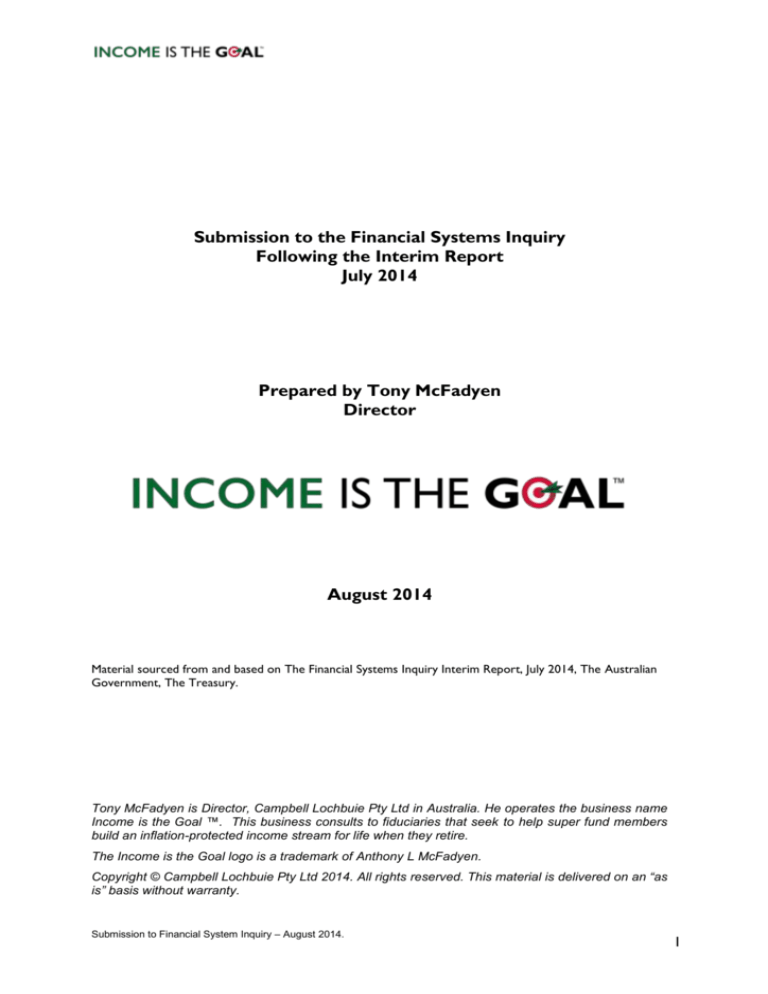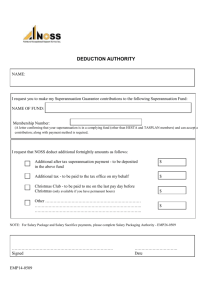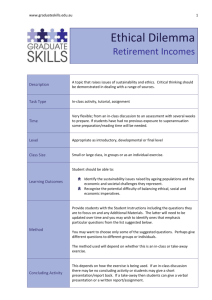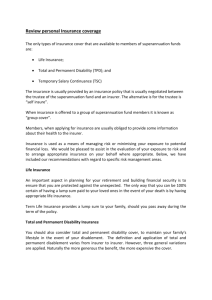
Submission to the Financial Systems Inquiry
Following the Interim Report
July 2014
Prepared by Tony McFadyen
Director
August 2014
Material sourced from and based on The Financial Systems Inquiry Interim Report, July 2014, The Australian
Government, The Treasury.
Tony McFadyen is Director, Campbell Lochbuie Pty Ltd in Australia. He operates the business name
Income is the Goal ™. This business consults to fiduciaries that seek to help super fund members
build an inflation-protected income stream for life when they retire.
The Income is the Goal logo is a trademark of Anthony L McFadyen.
Copyright © Campbell Lochbuie Pty Ltd 2014. All rights reserved. This material is delivered on an “as
is” basis without warranty.
Submission to Financial System Inquiry – August 2014.
1
Executive Summary
Income Is The Goal™ (IITG) is a new business in the Australian financial services
market. Commenced in June 2014 by Tony McFadyen, the service aims to foster
moving the current superannuation system into a new phase by focusing on the real
goal for individuals’ superannuation saving – that of an income in retirement.
The Financial System Inquiry (FSI) Interim Report asks industry participants to
respond to the Inquiry’s Observations and Questions. It is with pleasure that
Income Is The Goal™ makes a response to the Interim Report.
The issues and observations in the FSI Interim Report that IITG responds to are as
follows:
The purpose of superannuation
Fees
Financial literacy
Lifecycle investments
Consumer Outcomes
Retirement Income
IITG believe the role of default superannuation funds is central to pre and post
retirement policy, and that trustees should be mandated to act to improve the
likelihood of each individual achieving their desired income in retirement. Trustees
are able to mass customise their services, and administer accounts for individuals.
It should therefore be superannuation funds’ trustee responsibility to alter their
business strategies to reflect that income for individuals is the goal of their
organisations, not the management of assets to beat some inflation or market index
benchmark.
IITG agrees with the summation of the FSI Committee, that we have an inconsistent
approach to our retirement income system. We have a mandatory superannuation saving
system, with a strong default fund system and administration structure, albeit focused on
the wrong goal. The FSI should be advising Government that retirement income issues
must be considered holistically. A wide ranging review needs to consider, for instance, the
intergenerational efficacy of people being able to deplete all their superannuation savings
and then rely on the age pension for life, if they could have at least partially borne the cost
of their own retirement. A review should consider, amongst a myriad of pension and
regulatory issues, the tax on products (to ensure products that produce income streams
are not rejected purely for tax reasons), and it should extend to provide incentives to
people who do choose income over lump sums at retirement.
The Treasury Discussion Paper Review of Retirement Income Stream Regulation is an
important step in providing income in retirement. We trust the input from responses to
that paper will be included in the FSI final report.
Finally, IITG will not be alone in calling for substantially increased issuance of medium and
long dated inflation linked bonds, to allow people to save using their unique characteristics,
and product providers to hedge their exposures as income stream products increase their
use as our population ages and retires.
Submission to Financial System Inquiry – August 2014.
2
Introduction
Income Is The Goal™ (IITG) is a new business in the Australian financial services
market. Commenced in June 2014 by Tony McFadyen, the service aims to foster
moving the current superannuation system into a new phase by focusing on the real
goal for individuals’ superannuation saving – that of an income in retirement.
Income in retirement is the goal of any superannuation or pension savings
system. Every member of a superannuation or pension fund should have their
savings managed in a way that improves the probability of achieving the goal of a
satisfactory income in retirement. However we have a defined contribution fund
system in Australia that does not have this goal at its core. Superannuation funds
aim to maximise member balances, irrespective of their goals or their ability to
accept investment risk in its many forms.
The Australian superannuation and pension system has been mandatory for
employees of medium and large organisations since the Hawke and Keating
governments in the 1980’s. However the early architects of the system focused on
helping workers get access to some form of savings to provide for their lives in
retirement. They unfortunately did not focus on setting in stone the appropriate
overall ambitions of the system - an income in retirement.
The Financial System Inquiry (FSI) Interim Report asks industry participants to
respond to the Inquiry’s Observations and Questions. It is with pleasure that
Income Is The Goal™ makes a response to the Interim Report. It is important to
note that the very short time that the business has existed means that its own
fundamental analysis and research has not been completed. The opinions
expressed are my own based on observations and interactions with major
superannuation funds, consultants, trustees and boards, regulators and FSI staff on
the issues surrounding the provision of pensions and the management of assets to
create income streams for individuals in retirement.
This analysis draws heavily on the work of Professor Robert C Merton, and his
papers written to explain his Next Generation Superannuation System, most
recently reported in Harvard Business Review1. His paper was supplied to FSI by
Dimensional Fund Advisors (Australia) in its submission in July 2014. This
submission also draws on work done by a number of other Australian and overseas
academics researching this highly complex area.
Below are observations and responses to the FSI Interim Report.
The Purpose of Superannuation
While governments have not declared in legislation the fundamental purpose of
superannuation, a report prepared by the Charter Group in July 2013 on
superannuation adequacy and sustainability suggested these objectives:
1
to provide an adequate level of retirement income;
to relieve pressure on the Age Pension; and
http://hbr.org/2014/07/the-crisis-in-retirement-planning/ar/1
Submission to Financial System Inquiry – August 2014.
3
to increase national savings, creating a pool of patient capital to be invested
as decided by fiduciary trustees2.
IITG supports this summary, and would add that in the first point the focus should
be the individual. In this way the objective function of superannuation is both
community-based and individually focused. IITG would therefore amend the first
objective:
to provide an adequate level of retirement income for each Australian
to relieve pressure on the Age Pension; and
to increase national savings, creating a pool of patient capital to be invested
as decided by fiduciary trustees.
Fees
The Interim Report makes much comment on fees in superannuation funds,
presenting evidence from the Grattan Report ‘Super sting: how to stop Australians
paying too much for superannuation’ on the high cost of superannuation in
Australia 3 . IITG would caution against using this analysis in isolation, as the
findings need to be balanced with the amount of administrative and software
changes that have needed to be done by superannuation funds as a result of
successive changes to legislation and regulations in superannuation in the last 15
years. The amount of change has been large and constant, resulting in growing
system changes and costs.
There has also been recent submission to FSI by Herbert Smith Freehills stating –
“The submission contends that comparisons of the Australian system with
international counterparts must recognise the impact of Australian policy settings
such as compulsion, preservation, portability and the reliance on disclosure as a
regulatory tool. While these are valuable aspects of the Australian system, they are
inherent in the design of the system and are not a consequence of inefficient
implementation. Moreover, these policy settings are expensive to administer and
that cost is borne by market participants4. IITG concurs with these comments.
A chronology of the changes was recently created by The Dept. of Parliamentary
Services in February 20145. The summary runs for 51 pages!.
The FSI rightly comment that scale growth alone should have brought down fees,
IITG believe the combination of growth vs rule change has seen rule change
dominate, and as a result fees have remained relatively high.
Financial Literacy
The Productivity Commission recently published a paper on literacy and numeracy
skills of Australia, from a global study. “The Australian Bureau of Statistics (ABS)
conducted the Programme for International Assessment of Adult Competencies
2
A Super Charter: Fewer Changes, Better Outcomes, The Australian Government, The Treasury,
July 2013,P 21
3
http://grattan.edu.au/report/super-sting-how-to-stop-australians-paying-too-much-forsuperannuation/
4
http://www.herbertsmithfreehills.com/news/news-20140815-hsf-calls-for-robust-research-onsuperannuation-costs
5 Dept of Parliamentary Services, Feb 2014, Chronology of major superannuation and retirement
income changes in Australia, K Swoboda.
Submission to Financial System Inquiry – August 2014.
4
(PIAAC) survey during 2011-12 on behalf of the Organisation for Economic Cooperation and Development (OECD). The survey was conducted across 23
countries and the Russian Federation. Respondents were given various tasks to
assess their literacy and numeracy skills.
The authors of a recent Staff Working Paper – Anthony Shomos and Matthew
Forbes – found a strong correlation between literacy and numeracy skills among
Australians. That is, someone with low literacy is also likely to have low numeracy.
Australian literacy levels are above average OECD levels, while numeracy skills are
close to the OECD average (figure 2).
Despite this, there are many Australians with very poor literacy or numeracy skills.
In 2011-12:
14 per cent of Australians could, at best, read short texts from which they
were able to locate a single piece of information
22 per cent could only carry out one-step or simple processes such as
counting where the mathematical content is explicit with little or no
distractions.
People with lower skills tend to be those with lower levels of education, older
persons, people not working, and immigrants with a non-English speaking
background.”6
6
http://www.pc.gov.au/about-us/pc-news/literacy-and-numeracy-skills-and-labour-market-outcomes
Submission to Financial System Inquiry – August 2014.
5
The report supports ASIC’s7 recent work and the need to raise the financial literacy
of Australians. However the desire to improve financial literacy is a generational
issue. Small improvements will come from school based programs and the like, but
we will not achieve in any short (or long for that matter) period the type of
knowledge that is required for individuals to adequately manage their own, and then
in aggregate, the population’s superannuation and retirement income accounts.
The Super System Review 8 identified many reasons why people find
superannuation and retirement difficult to understand. It was copied into the FSI
Interim Report (Box 4.1). Superannuation is complex, and Government policy
should approach it recognising that people should not be asked to understand asset
allocation, volatility, equity styles and hedge fund structures etc. Choice and the
growth of Self Managed Superannuation Funds shows that some people want to
manage their own affairs. But these are by far the minority of working people in
Australia. For the majority, the most that should be asked is for them to understand
financial concepts as they relate to them, and then be given meaningful choices.
7
http://www.financialliteracy.gov.au/
Commonwealth of Australia 2010, Super System Review Final Report, Part One, Overview and
Recommendations, Commonwealth of Australia, Canberra, page 7
8
Submission to Financial System Inquiry – August 2014.
6
This type of principles or goals based approach will not require high financial
literacy.
Therefore IITG believes the role of default funds is central to pre and post
retirement policy, and that trustees should be mandated to act to improve the
likelihood of each individual achieving their desired income in retirement. Trustees
are able to mass customise their services, and administer accounts for individuals.
The only actions that individuals can take to improve their chances of an adequate
income in retirement is to
1.
2.
3.
save more,
work longer or
take more risk with their financial assets (superannuation).
Trustees should set up processes within their default funds that gives members
adequate but meaningful information about their prospects in retirement, and
operate with the statutory information they have to manage member accounts. It is
possible to mass customise member accounts using statutory information.
Lifecycle investments
As per above IITG believes that the more appropriate way to manage peoples’
superannuation is with a responsibility to manage at an individual level. Default
funds in pre and post retirement can do this. But the objective of these activities is
an income stream, not a pot of wealth for each member. The pot of wealth is
needed at retirement, but only to procure the income stream to support an income
in retirement. The lifecycle concepts have been adopted by many retail funds since
the introduction of MySuper. Professor Merton’s work is sometimes classed as
lifecycle, but an important distinction is that the current version of retail funds
lifecycle or target date funds is not a sufficient solution. The reason is that a target
date fund provides a glidepath for asset allocation, but it lacks a fundamental factor.
It has no goal. And that is a critical factor in managing to the outcome.
It is possible for a trustee to set reasonable goals for people’s retirement income in
their default funds. To do this it must be mandatory for reporting to be focussed on
the income expected from a persons’ superannuation account. Once income is
reported, then members can have a reasonable conversation about the goals they
want to achieve in saving for retirement. That would be a far more beneficial
conversation for members to have with their fund, than receiving a report detailing
hundreds or thousands of stocks bonds and properties that they own a miniscule
proportion of.
Consumer Outcomes
The factors that prevent disclosure from enabling better consumer decisions include
disengagement, complexity, consumer behaviour, supply-side conflicts and financial
literacy9.
Following the Public Forum meeting in Sydney of the FSI, IITG agrees with the
Committee that disclosure as per the Wallis Inquiry concepts has not been effective.
It now requires a balance between meaningful information and understanding the
limits of individual financial literacy and information asymmetries.
9
The Treasury, Financial System Inquiry Interim Report page 3-57.
Submission to Financial System Inquiry – August 2014.
7
This impacts FSI comments on financial advice and accessibility. Everybody needs
financial advice at different times in their life. But the capacity to pay along with the
knowledge of when you need financial advice is very limited. The trend to provision
of financial advice inside superannuation funds is positive as it can be provided
cheaply. However the limits on the type of advice might make the advice
ineffective. Scaled advice may be sufficient for many needs. Or as suggested on
page 3-71, “Technology, including automation and ‘mass customisation’ techniques,
provides an opportunity to offer consumers more cost-effective advice. It may also
enable new business models, such as scaled or automated online advice.” IITG
supports this approach.
Retirement Income
IITG strongly agrees with the summation on page 4-3 that we have an inconsistent
approach to our retirement income system. We have a mandatory saving system, with a
strong default fund system and administration structure, albeit focused on the wrong goal.
As discussed in the CEPAR Supplementary Submission10 to the FSI, the drawdown phase
has no mandatory elements, even though the behaviour and choices at and in retirement:
“have significant and long term consequences for the individual or household;
are often “once in a lifetime” decisions, precluding the possibility of learning from
experience;
are very complex, with many unknown variables;
often involve deciding on benefits a long way into the future, where issues of self‐
control become important; and
may be compromised in late life due to cognitive decline.”11
These are significant issues to deal with, especially as everyone in a defined contribution
system must deal with them on their own. So the real questions being asked about the
retirement income system are structural. In much the same way as IITG commented on
the purpose of the Superannuation System on Page 3 above, we contend that the first
purpose (to provide an adequate level of retirement income for each Australian) is a
whole of life requirement. It assumes saving to the point of retirement and then
providing the income in retirement to death.
As referenced in the Interim Report, there are significant behavioural issues above
that may be overcome or at least somewhat negated by some form of default or
mandatory structure. This may reduce risk for individuals, but will more likely
reduce risk for the government in terms of their ongoing age pension liability. We note
on page 4-8 that the inquiry is not considering a range of policy settings outside of or
peripheral to, the financial system, including the ages at which individuals can access their
benefits and receive these benefits tax-free.
However the FSI should be advising Government that these issues must be considered
holistically. This would extend to some mandatory conditions in the retirement years in
dealing with monies saved, but it is a complex area as the age pension, its means/asset
testing and many other factors would need to examined concurrently. (And no doubt the
industry would scream about the probability of yet more change in regulation.) But a wide
ranging review needs to consider, for instance, the intergenerational efficacy of people
10
11
Bateman et al, ARC Centre of Excellence in Population Ageing Research, June 2014.
ibid
Submission to Financial System Inquiry – August 2014.
8
being able to deplete all their superannuation savings and then rely on the age pension for
life, if they could have at least partially borne the cost of their own retirement. This is also
mentioned on page 4-19 of the Interim Report.
We note that Treasury have released a Discussion Paper on the Review of Retirement
Income Stream Regulation July 2014. Many of the issues on retirement income in the
Interim Report are covered in the Discussion Paper. We trust that the input and review
will form part of the FSI deliberations and report to Government.
The materials presented on page 4-21 to 4-23 about defaults and how they shape
behaviours is useful. Empirically the research suggests benefits from government designing
a post retirement default structure. However there is much community history and
expectation to be overcome if government goes all the way to mandating a certain default
post retirement structure. IITG suggests that government prescribe minimum policy
structures, without hard and fast breakpoints or mandatory features.
The difficulty is in even suggesting policy guidelines is that much work needs to be done to
ensure products with strong benefits (such as annuities or deferred annuities) should not
be taxed so that they are rejected on that basis. Similarly, deeming rules and the asset test
for the age pension (for example) need to be realistically applied with respect to all assets.
And if the objective of the superannuation system is to provide income in retirement then
there should be positive tax and age pension eligibility bias towards income stream
products and elections not to take lump sums at retirement.
All of this will be made more difficult if the upcoming taxation review just looks at tax
revenues, and not the flow on effect on pensions, drawdowns from pensions and eligibility
criteria for pensions, as well as the much needed changes to tax on deferred annuity
structures. So to answer the questions posed on 4-25 & 4-32, mandating the use of
particular products will cause issues that mask the real requirements of retirees. It would
be preferable for government to create a policy framework for fund default options in
retirement, that takes into account:1. age pension eligibility,
2. ability of individuals to support their own retirement (such as any amount over say
$500,000 in superannuation at retirement then there are certain incentives to
purchase income stream and deferred income stream products.)
3. ability of person to access equity in the family home if owned outright (with support
for the reverse mortgage market required by industry)
4. ability of individuals to access risk free assets to support cash flow needs in
retirement (This requires Treasury and AOFM to substantially increase issuance of
medium and long dated inflation linked bonds. This is an essential government
commitment to be requested by FSI as it would assist funds to provide safe income
stream products as well as allow product providers a hedge for the products they
would create and sell to retirees).
Policy around retirement income is difficult, more so with the complex interplay of welfare,
mandatory superannuation, pressure on government tax revenue and the concessions that
superannuation and retirees receive on their earnings on their savings. Once the purpose
of superannuation is clearly defined, and innovation impediments are removed, IITG is
confident that the financial services industry will provide satisfactory and differentiated
solutions for people to be advised and manage their affairs such that they achieve their
most important outcome from saving in superannuation funds – that of their desired
income in retirement.
Submission to Financial System Inquiry – August 2014.
9






